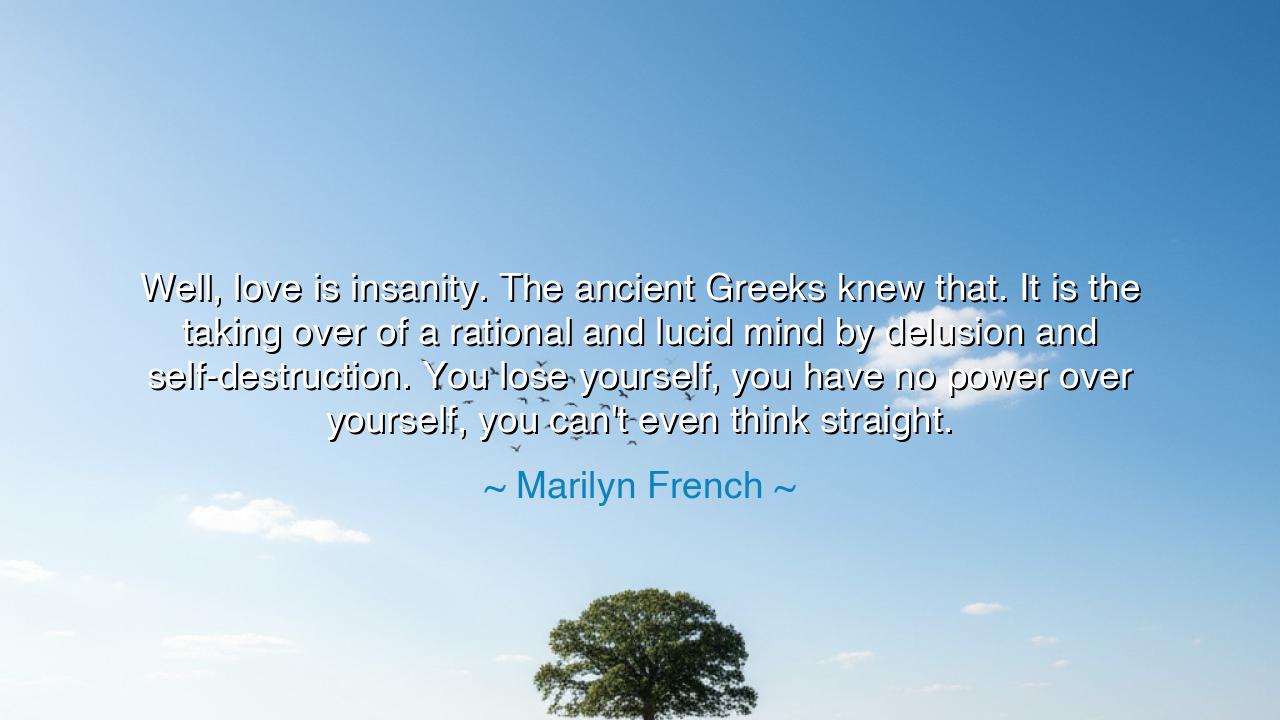
Well, love is insanity. The ancient Greeks knew that. It is the
Well, love is insanity. The ancient Greeks knew that. It is the taking over of a rational and lucid mind by delusion and self-destruction. You lose yourself, you have no power over yourself, you can't even think straight.






Hearken, O children of the heart, to the piercing insight of Marilyn French, who speaks of the turbulent nature of love. She reminds us that the ancients, the wise Greeks, recognized love as a form of insanity: a force that overtakes the rational and lucid mind, replacing reason with delusion, clarity with self-destruction. Herein lies a warning for all generations: the heart, when seized by passion untempered by reason, may lead the soul astray, and even the strongest intellect may falter under love’s overwhelming sway.
The origin of this reflection lies in French’s life as a writer, thinker, and observer of human behavior. Her insight is steeped in both literary tradition and historical understanding, drawing from the wisdom of the ancients who chronicled the frenzy of the heart. In her view, love is not merely a gentle affection, but a powerful force capable of erasing self-control, clouding judgment, and demanding sacrifices that the mind may not fully comprehend.
The meaning of this aphorism is profound: to love is to risk surrendering the self, to allow one’s reason and power of thought to be eclipsed by passion. The heart, when enthralled, can lead one into delusion and folly, obscuring what is true, just, or wise. French reminds us that in love, one may lose oneself, struggling to maintain command over action and thought, and becoming vulnerable to forces both internal and external.
History offers vivid examples of this truth. Consider Romeo and Juliet, whose hearts, seized by overwhelming passion, acted with reckless abandon, defying families, reason, and prudence. Their love, though immortalized in story, led to tragic consequences, demonstrating the ancient warning: when the mind is overtaken by desire, even the most rational and noble souls may falter, and self-destruction may follow in the wake of overwhelming emotion.
Moreover, this teaching extends beyond the extremes of literature and myth. In daily life, those who allow passion to dominate judgment may find themselves ensnared by jealousy, obsession, or unwise decisions. French’s counsel is a call to temper love with awareness, to recognize its power, and to strive to preserve lucidity, even while surrendering to the profound forces of the heart.
O generations yet unborn, take this counsel into your hearts: cherish the fire of love, but be ever vigilant of its insanity. Guard your mind and your reason, lest passion sweep away your clarity, and let the wisdom of the ancients guide your steps. For in understanding the dual nature of love—its beauty and its peril—one may navigate its tumultuous currents with insight, preserving the self while honoring the depths of the heart.






TNNhuyen thi tuyet nhung
Reading this evokes thoughts on the dangers and exhilaration of surrendering to love. Does describing love as a form of insanity imply it’s destructive, or simply that it defies conventional logic? I wonder how this idea intersects with literature and philosophy, which often portray love as both a source of suffering and enlightenment. Is it possible to experience intense love without losing self-control, or is some degree of irrationality inevitable in profound emotional attachment?
TThao
This statement makes me question the balance between reason and emotion. If love is inherently disruptive, does it mean we should approach it cautiously, or embrace its transformative potential despite the risks? Could there be ways to experience deep passion while maintaining some rational perspective? I’m also curious whether French’s view reflects a personal cynicism toward love, a cultural observation, or a more universal commentary on human behavior.
LVChau Hoang Le Vy
I find this idea provocative because it portrays love as something that undermines autonomy and clear thinking. But could this loss of control also lead to creativity, deep connection, or profound insight? How do we reconcile love’s irrationality with its role in building families, communities, and social bonds? I also wonder if modern psychology and neuroscience have evidence to support this notion of love temporarily overriding rational thought, and how that aligns with lived experience.
GNGam Nguyen
Reading this, I feel both intrigued and unsettled. If love takes over the mind so completely, how can we distinguish between passion and delusion? I also question whether Marilyn French is describing a universal truth or an extreme case of romantic obsession. Does this perspective apply to all forms of love, or primarily to romantic love? It makes me curious about historical and psychological interpretations of love as a potentially destabilizing force.
NPVo Nhu Phung
This quote makes me reflect on how love can radically affect our judgment and behavior. Is it truly akin to losing control, or is this an exaggeration of intense emotional experiences? I also wonder whether this 'insanity' is purely negative, or if losing oneself in love can bring growth, empathy, and vulnerability. Could the idea that love disrupts rationality be why it’s both feared and celebrated across cultures?